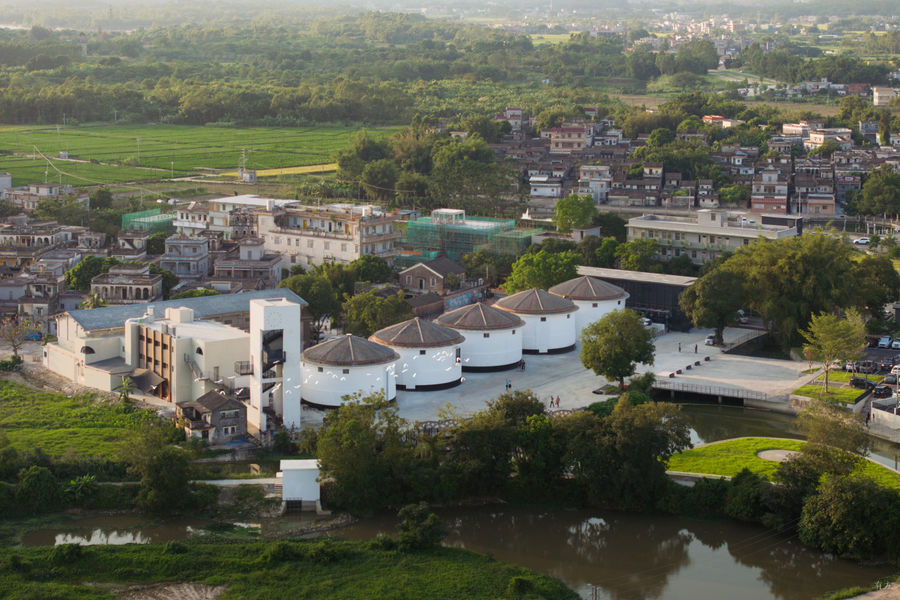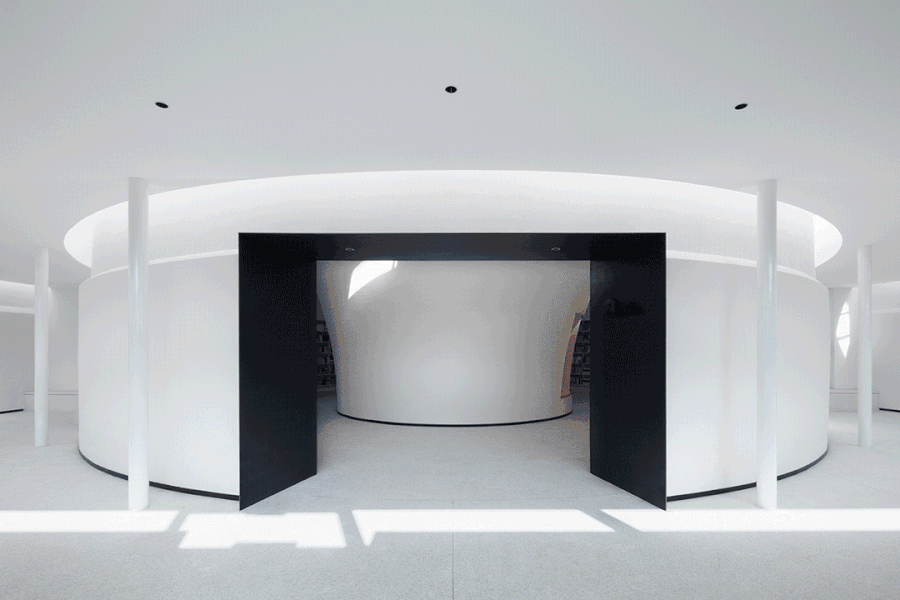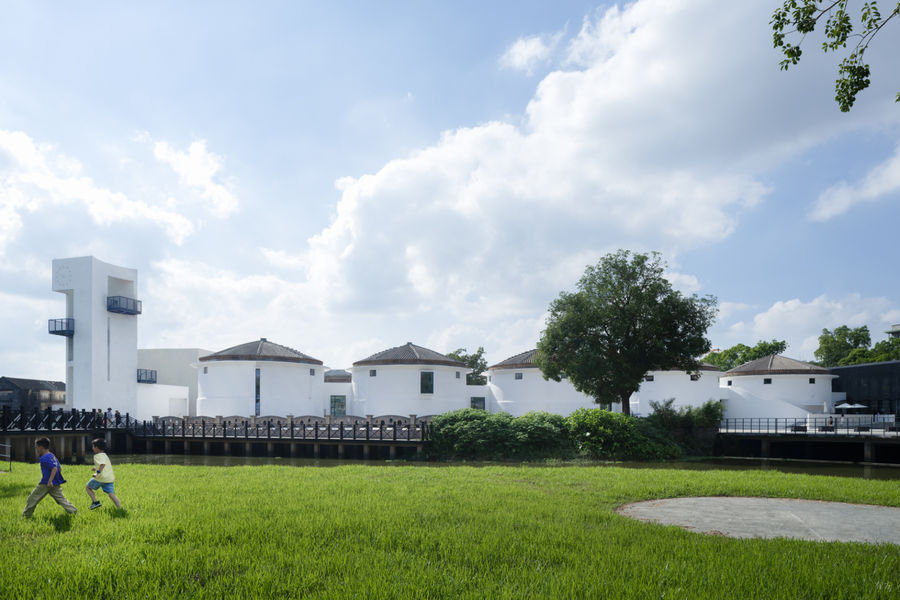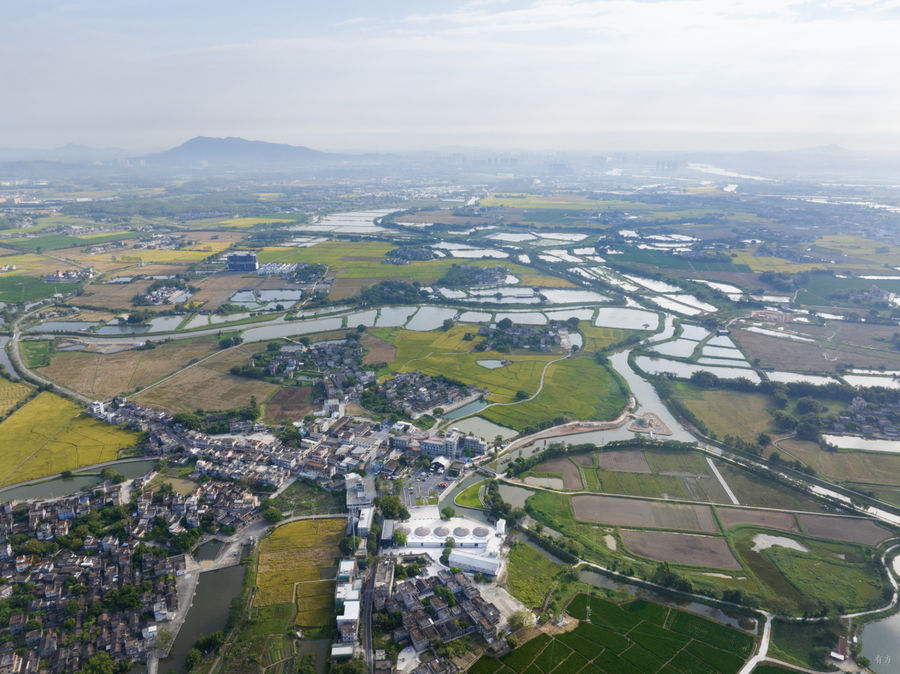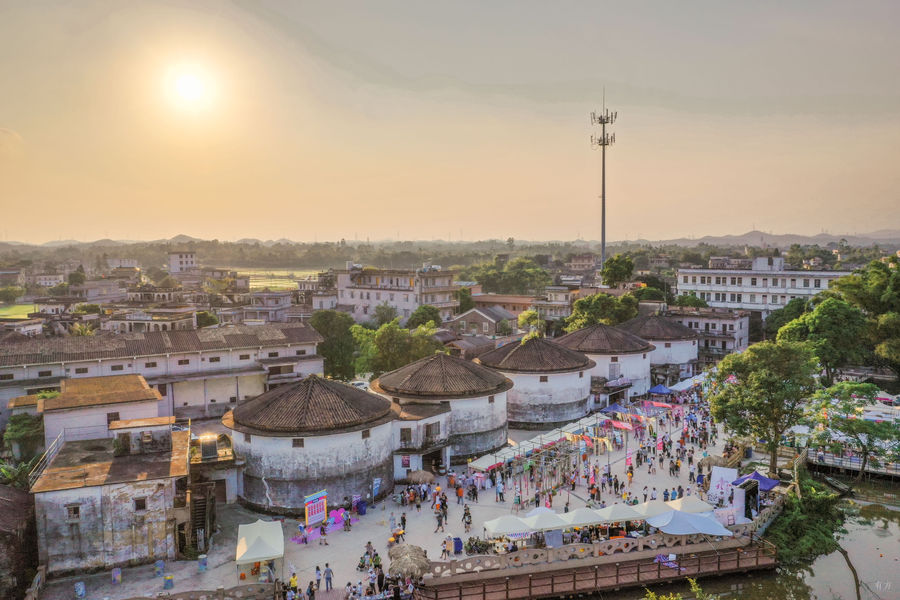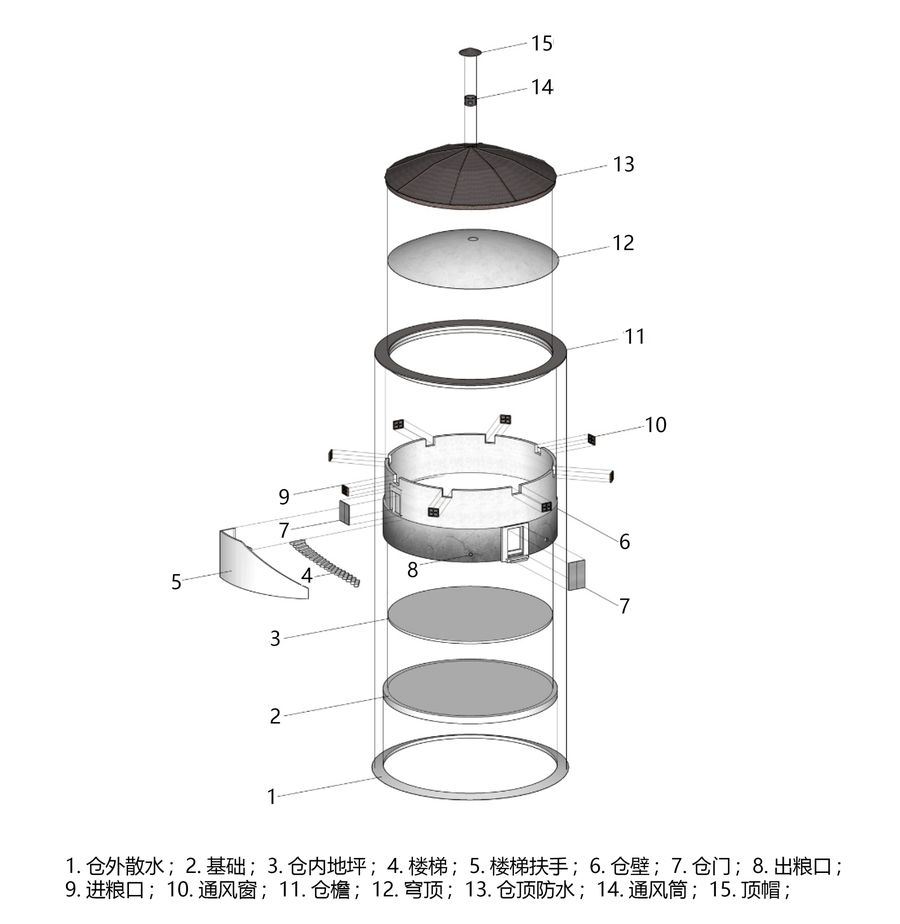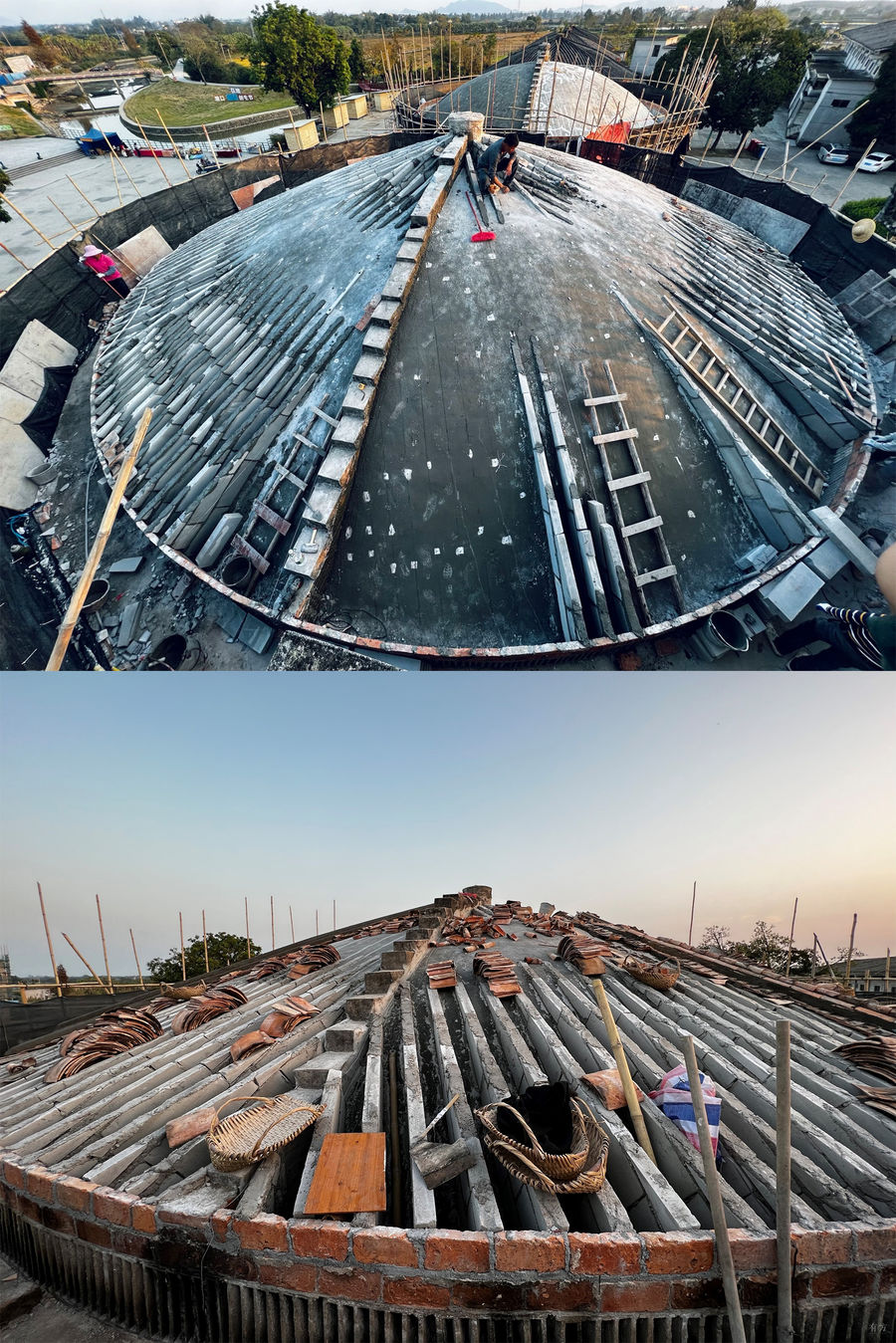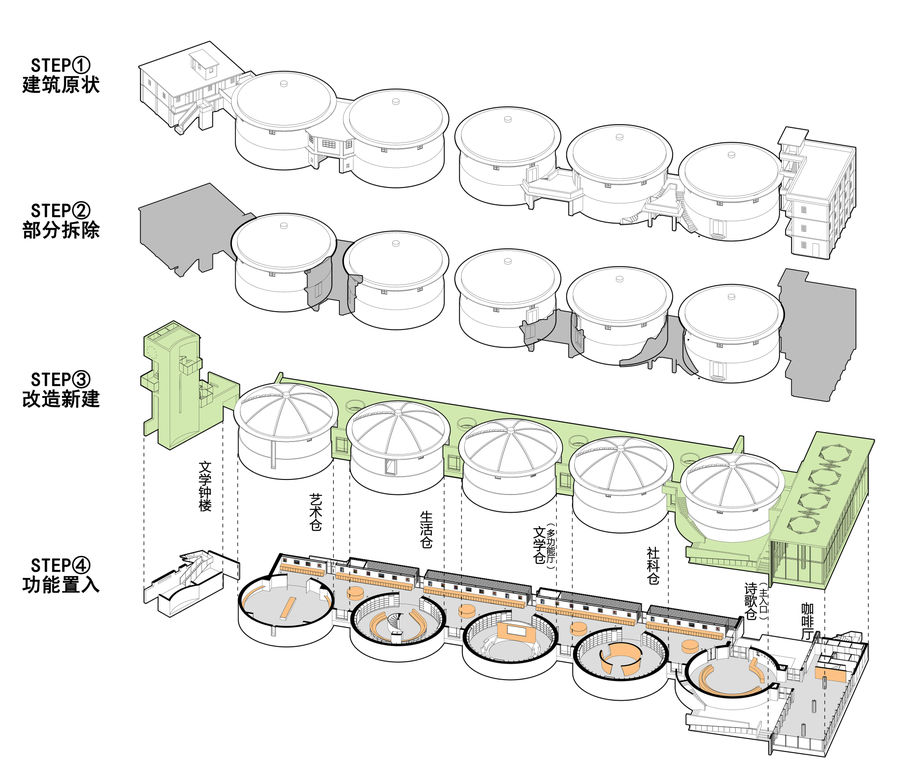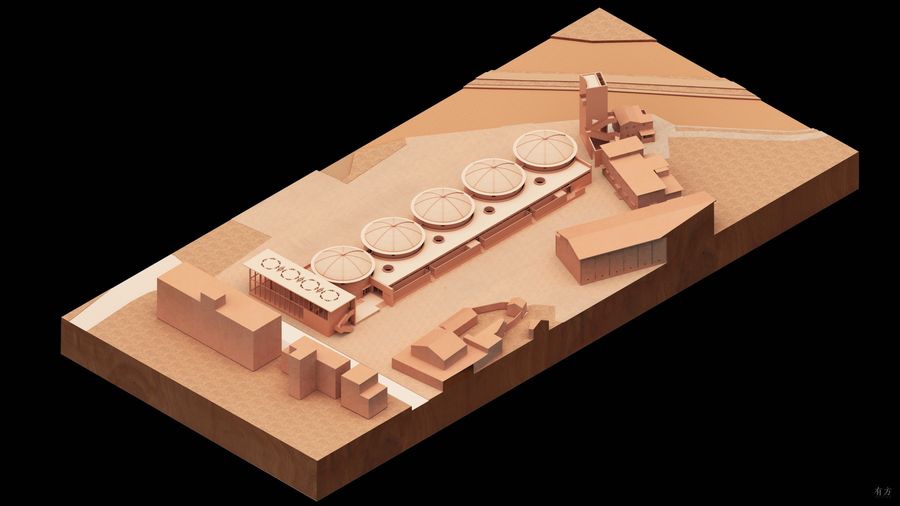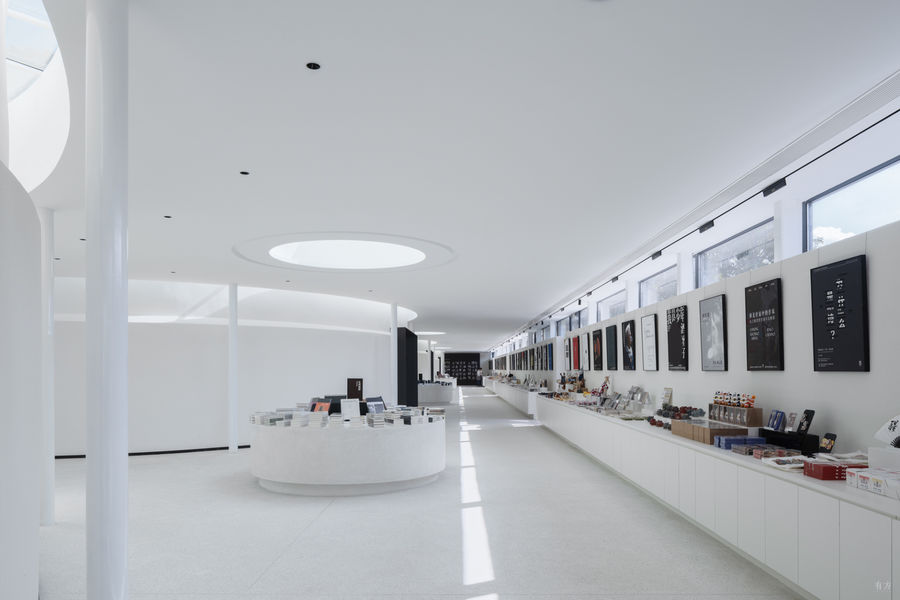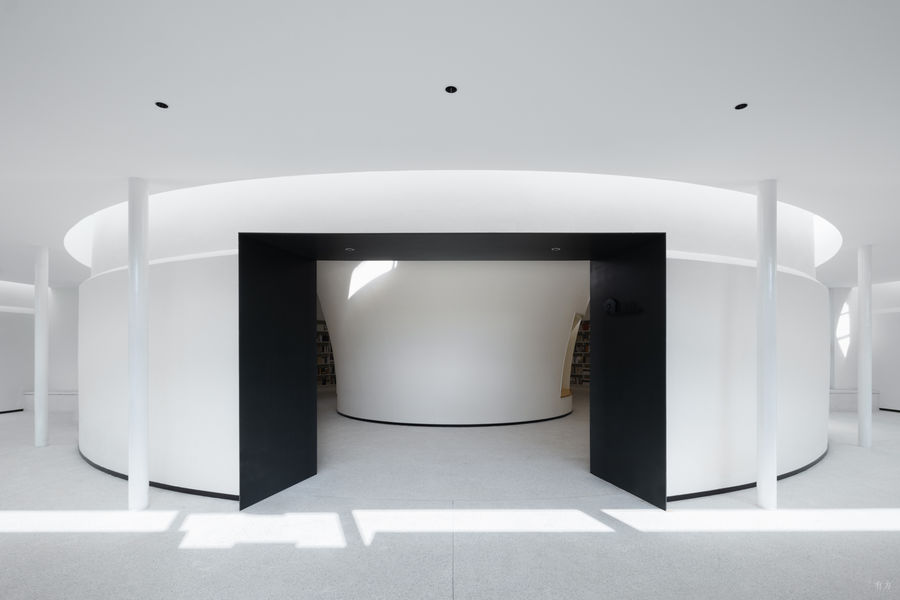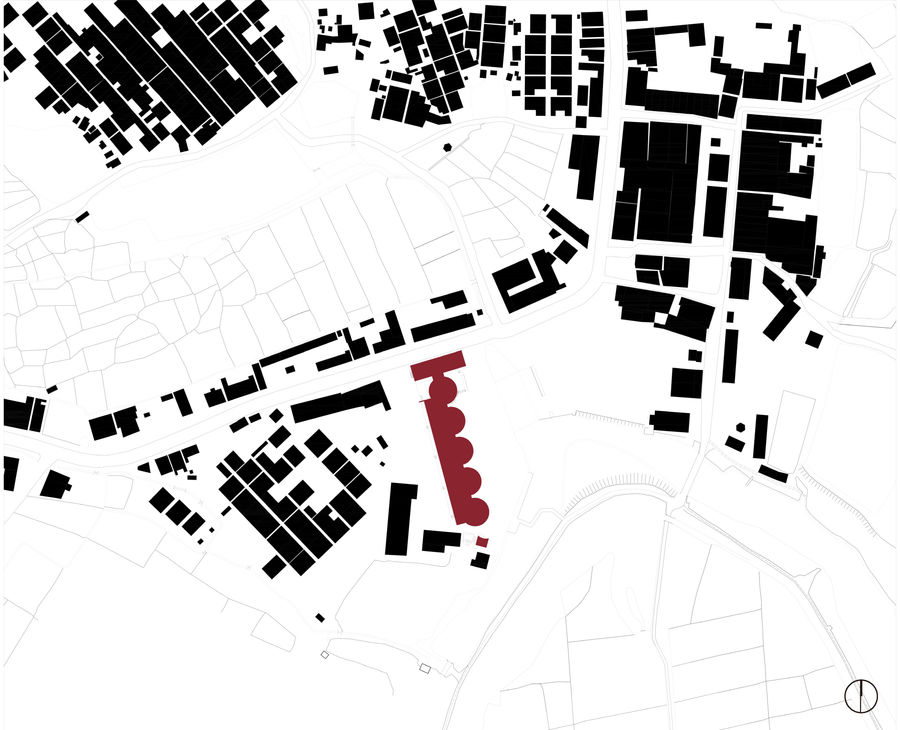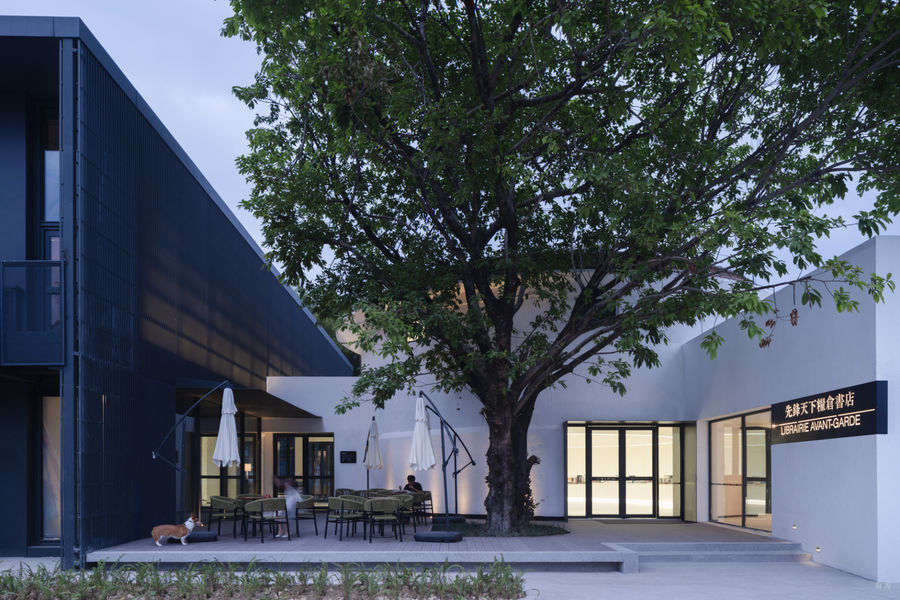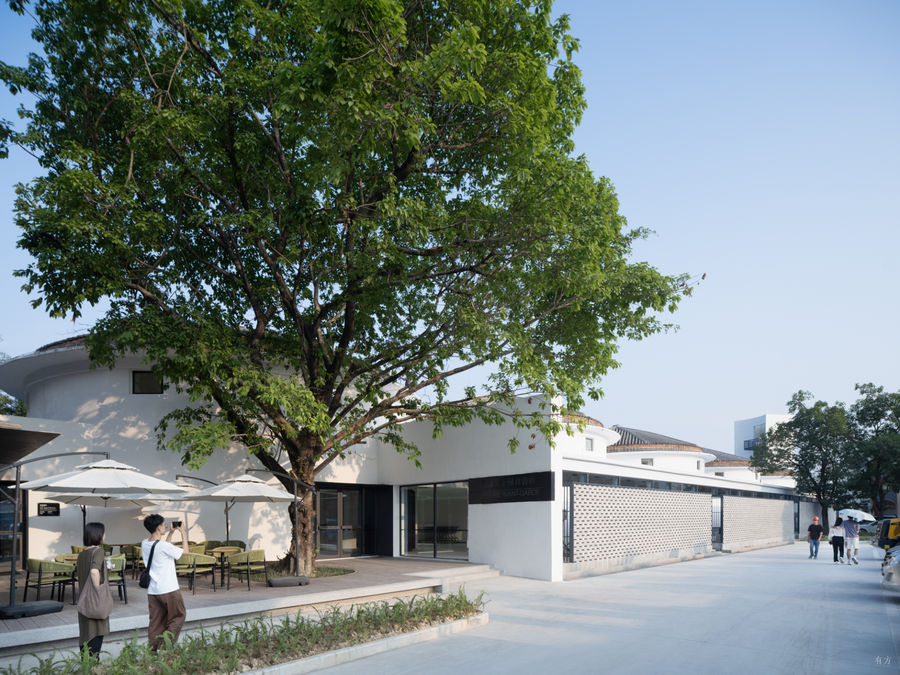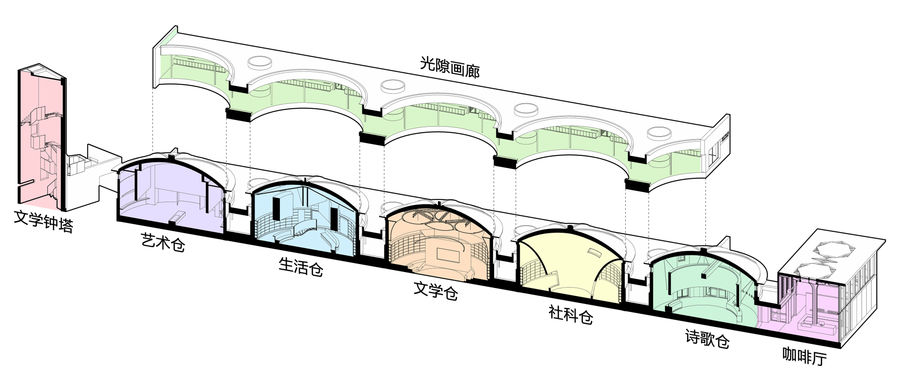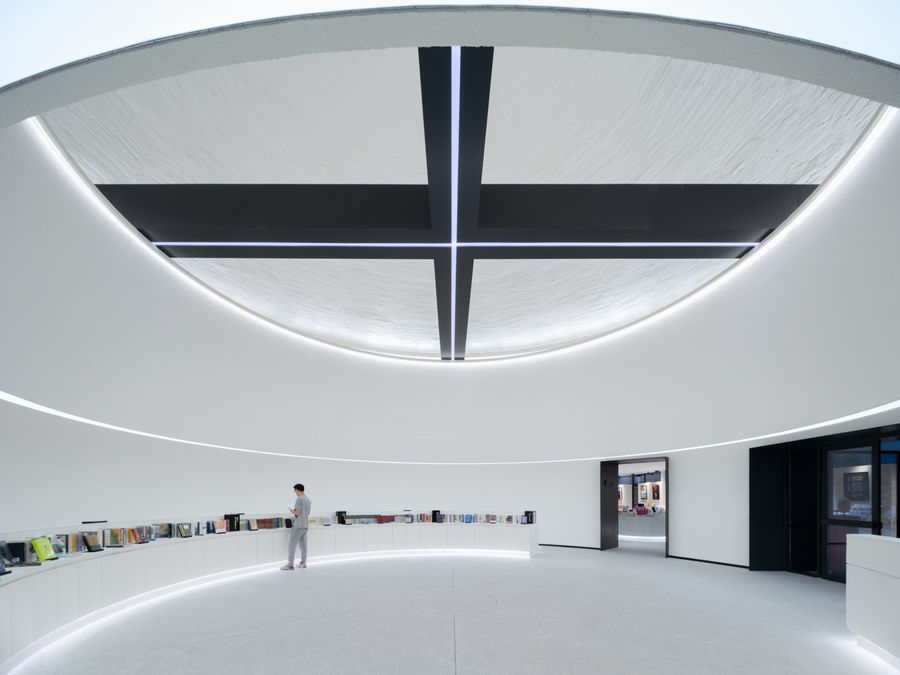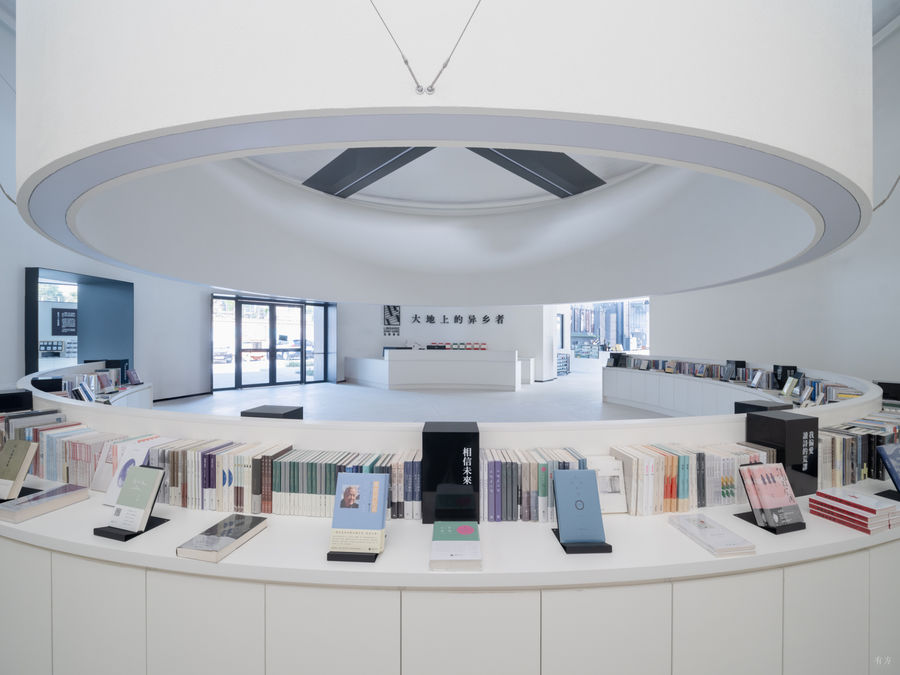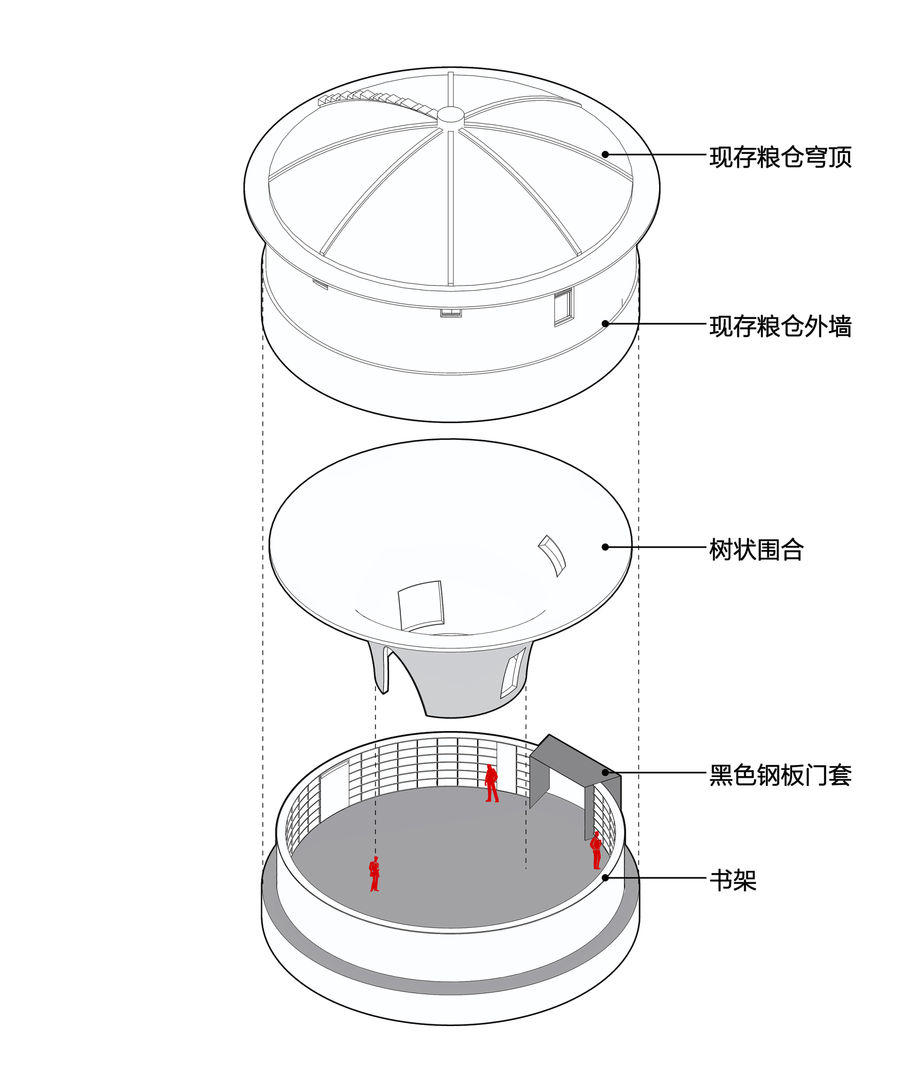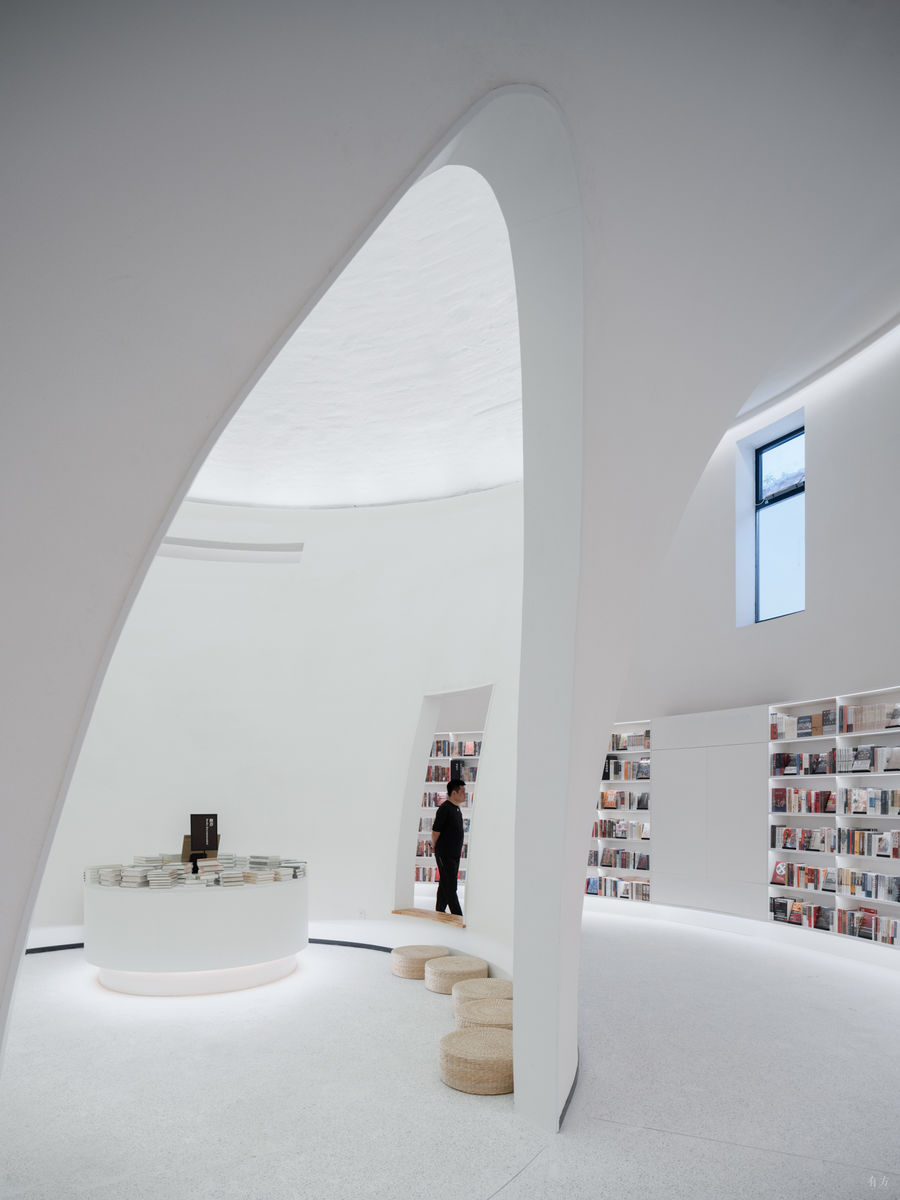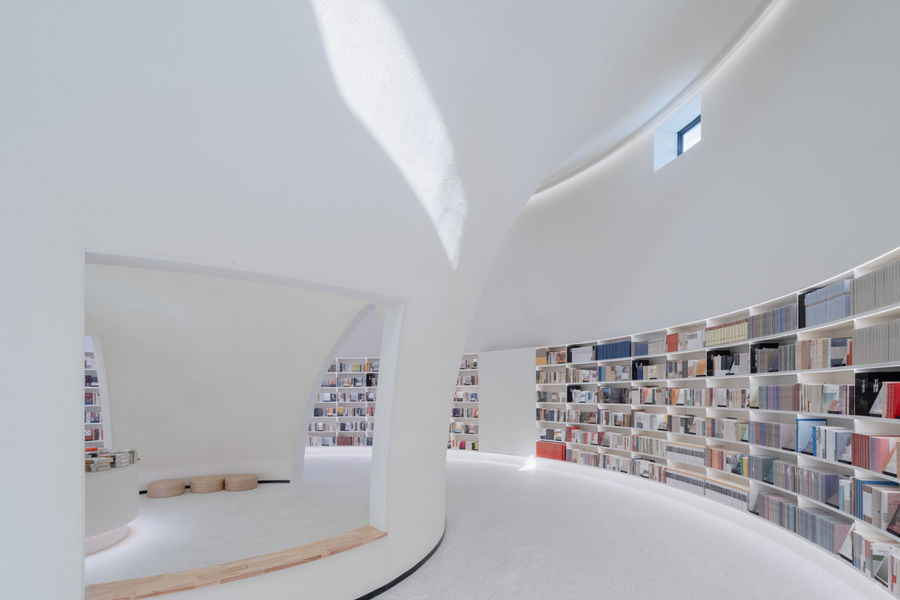改造后粮仓整体鸟瞰 摄影:存在建筑-建筑摄影
画廊与1-5号筒仓 摄影:存在建筑-建筑摄影
设计单位 东南大学建筑学院+艺合境建筑设计事务所
项目地点 广东江门
建成时间 2023年11月
建筑面积 1600平方米
本文文字由艺合境建筑设计提供。
从物质粮仓到精神粮仓
目前在中国的不少乡村中存在着一种圆形的砖砌筒仓,过去一直作为粮仓使用。筒仓的起源可以追溯到上个世纪的60年代,因为特殊的年代背景,当时一场“深挖洞,广积粮,备战备荒”的运动正在全国开展。在这种情况下,国家亟需建设大量的粮仓,但由于当时缺少建设粮仓的资金,也缺少建造高标准仓库的钢材,因此就要求各个地方因地制宜,就地取材建设粮仓以备用,乡土筒仓就是在这一时期应运而生。到了70年代中期,全国除台湾以外的所有省市的乡村都建有粮仓,后来随着时代的变化,到今天基本都被弃用了。
There is a kind of circular brick granaries in many villages in China, which have been used for grain storage in the past. The origin of granaries can be traced back to the 1960s. Due to the special historical background, a movement for " accumulating grain " was carried out across the country, because of lacking of funds and high-standard steel materials, a large number of granaries with local materials were built. By the mid-1970s, granaries were built in villages in all provinces and cities across the country, and with the changes of the times, which have been abandoned now.
在广东省著名的侨乡及世界文化遗产碉楼群所在地——江门的开平市塘口镇,就留有一组五个这样的筒仓。先锋书店选址在这五个筒仓,也是看中了其历史价值和其形态的特殊性。他们希望不仅能使废弃多年的筒仓被重新活化利用起来,而且能为先锋的华南地区第一家乡村书店创造一种特殊的书店空间品质。
In Tangkou Town, Kaiping City, the famous hometown of overseas Chinese and the location of the World Cultural Heritage Diaolou Group in Guangdong Province, there is a group of five such granaries. The location selection of Librairie Avant-Garde in these five silos also emphasizes its historical value and unique form. They hope that not only can the abandoned granaries be revitalized and reused, but also create a special quality of bookstore space for the first rural Librairie Avant-Garde in South China region.
从田野看向先锋书店 摄影:存在建筑-建筑摄影
筒仓目前的所在地靠近塘口镇的边缘地带,但粮仓前的广场却是乡村市集(当地人称之为墟集)所在地,因此在某种程度上这里也是整个村镇的活动中心。而且其周边本身也已经有了不少乡建的项目:青创基地、民宿、艺术家和建筑师的工作室等等。
The granaries are located close to the edge of Tangkou Town, and the square in front of the granaries is the location of the rural market. So to some extent, it is also the activity center of the entire village. Moreover, there are already many rural construction projects around it, such as youth entrepreneurship bases, homestays, studios for artists and architects, and so on.
村落整体鸟瞰 摄影:存在建筑-建筑摄影
01现状
书店的改造用房一共七栋,除了一字排开的五个筒仓之外,还有位于筒仓以北后来加建的一幢三层宿舍楼,以及筒仓南端的二层小办公楼。筒仓与筒仓之间的也有不少加建,彼此之间并不完全独立。
There are a total of seven renovation buildings for the bookstore. In addition to five granaries arranged in a straight line, there is also a three story dormitory building located at the north, as well as a two-story small office building at the south end of the granaries. There are also many additional constructions between granarie.
五个筒仓均是砖混结构,经结构检测其质量均为A级,都可以正常使用,但屋顶部分因为年久失修,均有不同程度的渗漏,亟需修缮。而宿舍楼和二层小楼则存在各种安全隐患,现状情况不够理想。
The five granaries are all brick and concrete structures, and their quality has been tested to be Grade A, which can be used normally. And the roof part has varying degrees of leakage due to long-term disrepair. However, the current situation the dormitory building and two-story small building is unsafe.
天下粮仓原貌 ©艺合境建筑设计
作为粮仓,筒仓本身具有独特且合理的空间构造。原有粮仓的室内地坪比室外广场高出了80公分,在当年粮食存储条件极为有限的情况下,在南方潮湿、多雨、高热的气候条件下,粮仓达到了防洪、通风、防虫等的功能,体现了过去民间建造中的集体智慧。
As a granary, the silo itself has a unique and reasonable spatial structure. The indoor floor of the original granary was 80 centimeters higher than the outdoor square. In the past, in the humid, rainy, and hot climate conditions of the south, the granaries achieved functions such as flood prevention, ventilation, and insect prevention, reflecting the collective folk wisdom.
原始粮仓结构分解图 ©艺合境建筑设计
02修缮
五个筒仓在进行空间改造之前的第一步就是修缮,这其中主要是仓顶修缮。过去这种砖圆仓仓顶的建造方式一般有四种,分别是混凝土穹顶、混凝土攒尖顶、砖砌穹顶和木屋架攒尖顶。本项目用的是混凝土攒尖顶的建造工艺。
The first step before the renovation of the granaries is repairing, mainly the top of the silos. In the past, this kind of brick silo roof was generally constructed in four ways, namely, concrete dome, concrete tented roof, brick dome and wooden tented roof. These granaries use the construction technology of concrete tented roof.
仓顶的具体做法是:先把穹顶等比例分成八瓣,然后用砖在混凝土穹顶上砌出一道道砖“龙骨”,每一瓣里的砖“龙骨”都是平行的,使穹顶变成尖顶,这一步就确定了仓顶的形状。然后再用混凝土把仰瓦(宽、曲率小)固定在一道道砖上,把俯瓦(窄、曲率大)盖在仰瓦的缝上。最后再用混凝土把俯瓦包裹起来,仓顶中心的尖尖留出孔洞来通风。
这种做法在降水量大的地区能够更快地排走仓顶上的雨水,同时砖脊在仓顶又形成了隔热层,使仓内的温度相对稳定。可以说这是真正的低造价的绿色建筑。“米”字形的仓顶分隔使得筒仓无论是鸟瞰还是人视都具有很好的形象感受。这样通过使用原有工艺对仓顶的修缮与再造程,筒仓的仓顶渗漏问题得以解决,并基本保持了其原有的风貌。
粮仓屋顶修缮 ©艺合境建筑设计
03改造策略
首先是五个筒仓及其南北两翼两栋建筑的取舍问题。五个筒仓肯定是要保留的,但两端的宿舍和小办公楼因为年久失修,结构安全性不高,且房屋的本体价值不佳,如保留会有较高的加固及改造费用。因此设计中选择将这两处房屋拆除,结合功能在原址新建的策略。另外将连接筒仓的各种搭建也都做拆除处理,这样筒仓就非常清晰地呈现出其在建设之初的原始样貌。
The first issue is the demolishing choice of the two buildings on the north and south wings. The five granaries must be preserved, but the dormitory and small office buildings at both ends are under the low structural safety due to long-term disrepair, and the intrinsic value of the houses is not good. If preserved, there will be high reinforcement and renovation costs. Therefore, the design chose to demolish these two houses and combine their functions to build new ones on the original site. In addition, various structures connecting the granaries will also be dismantled, so that the granaries can present their original appearance very clearly.
改造策略 ©艺合境建筑设计
轴测示意图 ©艺合境建筑设计
其次,对于五个独立的筒仓而言,要满足先锋书店的使用功能有两种连接方式。一种是串联的方式,通过筒仓的中心,用廊道连结起来。这种方式的流线最为便捷,但缺点是除了末端,每个筒仓都会有两个开口,而且交通在中间,书店的使用功能一定会受到不同程度的影响。还有一种则是在五个筒仓的一侧进行连接,这样的好处在于每个仓体只需要在一侧开口,筒仓可以相对完整地保留,人的交通动线在外围,购书和看书的行为不会受到太多的干扰。
Secondly, for the five independent granaries, there are two connection methods to meet the usage functions of the bookstore. One way is to connect by a corridor through the center of the granaries. which has the most convenient streamline, but the disadvantage is that apart from the end one, each granary has two openings, and the transportation will be in the middle, which will inevitably affect the functionality of the bookstore. Another method is to connect on one side of the five granaries. The advantage is that each granary only needs to be opened on one side, and the granaries can be relatively intact. So the reading will not be disturbed.
再者,筒仓的东侧面向广场,如果在这一面进行连接的化,虽然可以和广场形成很好的互动,但其立面相比原貌势必会有较大的改变,而筒仓东侧一直以来都是广场上各种活动的背景,“天下粮仓”几个字也是镌刻在这一侧的仓体之上,这形成了具有集体记忆的特殊场景。设计还是要保留下这种具有时间维度的场所氛围,而把连接体设置在了西侧,虽然这样会牺牲一定的开放性和互动性,但为村落保留了更加永恒的场所和记忆。
The east side of the granaries face the square. If connected on this side, although it can form a good interaction with the square, its facade will inevitably undergo significant changes compared to its original appearance. The east side of the granaries has always been the background of various activities on the square, and the words " Grand Granaries" are also engraved on this side of the silo, forming a special scene with collective memory. The design still needs to preserve this temporal atmosphere of the place, so the connecting corridor is set on the west side, although which sacrifices some openness and interactivity, it preserves a more eternal place and memory for the village.
光隙画廊
摄影:存在建筑-建筑摄影
画廊中开向粮仓的入口
摄影:存在建筑-建筑摄影
在确定了书店主体连接方式的基础上,两端分别设置咖啡馆和文学钟楼。最后形成的总平面是七栋建筑并置地组合在一起,这看似奇怪,但却又合情合理,也因此创造出非常独特的书店空间,而这也正是筒仓改造的魅力。
On the basis of main connection of the granaries, coffee shop is set up at the north end and literary bell towers at the south end. The final overall plan is a combination of seven buildings placed side by side, which may seem strange but reasonable, creating a very unique bookstore space, and this is also the charm of the granaries renovation.
总平面图 ©艺合境建筑设计
04书店设计——空间装置
在总图设计中,我们没有将主入口放置在朝向广场一侧,而是放在了背面的西侧,原因和现状有关。在1号仓的这一侧有一棵直径1米多的大榕树,它几乎已经和仓体融为一体,这是一副自然与时间的画面,设计想充分利用这一场景,从榕树下进入书店。广场一侧作为次入口使用,同时双入口的设计也有利于通风。主入口位于1号仓,其两侧一边是咖啡馆,一边是通过长廊相连的各个筒仓,整体布局简单明了。
In the overall design, we did not place the main entrance on the side facing the square, but on the west side, for reasons related to the current situation. On this side of Granary 1, there is a large banyan tree with a diameter of over 1 meter, which has almost merged with the granaries. This is a natural and temporal scene, and the design wants to fully emphasize this scene by entering the bookstore from under the banyan tree. The square side is used as a secondary entrance, and the design of dual entrances is also conducive to ventilation. The main entrance is located in Granary 1, with coffee shops on one side and various granaries connected by a long corridor on the other, making the overall layout simple and clear.
书店主入口
摄影:存在建筑-建筑摄影
从主入口看向粮仓
摄影:存在建筑-建筑摄影
就筒仓而言,每个的建筑面积约165平方米,仓体内部最低处6米,穹顶最高处8.4米左右。整个的体量和空间还是比较大的。面对这样的高大空间,设计确立了两段式的原则,下部是书架段,高度不超过2.4米,近人尺度,便于读者取阅书籍,上部用我们设计的“空间装置”来进行填充。五个仓的“空间装置”各不相同,其功能除了解决下部书架段的采光之外,更多的具有精神属性,它们同阅读空间共同构成每个仓体不同的体验和感受。
As for the granaries, each has a construction area of approximately 165 square meters, with the lowest point inside the silo being 6 meters and the highest point on the dome being around 8.4 meters. Faced with such a tall space, we designed 2.4 meters bookshelf close to human scale, making it easy for readers to access books. The upper part is filled with "space installation". The spatial installations of the five granaries are different, and their functions not only lighting the lower bookshelf section, but also have more spiritual attributes. Together with the reading space, they form different space atmosphere for each granary.
剖轴测示意图 ©艺合境建筑设计
1号仓是诗歌仓,并兼具书店的收银区,同时也是主入口进入后的公共门厅。诗歌是先锋书店最看重的部分,因此往往将诗集设置在书店入口区域。在这里,我们没有设计书架,而是做了一个半圆形的展台来摆放诗集。展台上空是用“十字形”结构吊起的环形装置,它压低了展台区域的高度,并照亮展台。人们在取阅书籍的同时,还能感受到上部环形空间装置所产生的向上的力量。
Granary 1 is for poetry collections, and also serves as the cashier area of the bookstore, as well as the public entrance hall after entering the main entrance. Poetry is the most important part of Librairie Avant-Garde, so poetry collections are often set up at the entrance area of the bookstore. Here, we did not design a bookshelf, instead, we designed a semi-circular exhibition stand to display books. Above the stand is a circular device suspended in a "cross shaped" structure, which lowers the height of the booth area and illuminates it. While reading books, people can also feel the upward force generated by the upper circular space installation.
不难看出,书籍在1号仓中只占了很少一部分空间,其他部分都是在烘托和创造氛围,这正是设计的初衷:书是主角,就像美术馆可以为一件作品专门设一个展厅一样,这里不用书籍做装饰。
It is not difficult to see that books only occupy a small part of the space in Granary 1, while other parts are used to set off and create the atmosphere. This is precisely the original intention of the design: books are the protagonist, just like an art museum can set up a dedicated exhibition hall for a piece of work. In this bookstore, books are not used as decoration.
1号仓分解图 ©艺合境建筑设计
1号仓顶装置
摄影:存在建筑-建筑摄影
1号仓看向入口和前台
摄影:存在建筑-建筑摄影
2号仓是社科仓。社科类图书一直以来都是先锋书店的优势品类,量也较大,所以在设计中我们整体沿筒仓布置了一圈2.1米高的书架,有接近40米长,书籍的量还是很可观的。同时我们在仓体中心设计了一个倒锥形的装置,装置中心是阅览和休息区,上部和筒仓6米高处相连,如同一朵盛开的牵牛花。书架区和阅览区被巧妙分隔开来,巨大的曲面造型结合上面的一些孔洞处理,透过内外光线的变化,形成很强烈的视觉效果,读者在此宛如置身于一个巨大的空间雕塑之中。
Granary 2 is for social science collections. Social science books have always been the advantage category of Librairie Avant-Garde, with a large quantity. Therefore, in the design, we have arranged a circle of 2.1 meter high bookshelves along the granary, which is nearly 40 meters long. At the same time, we designed an inverted conical device in the center of the granary, with the reading and resting area at the center, and the upper part connected to the silo at a height of 6 meters, like a blooming morning glory. The bookshelf area and reading area are separated, with huge curved shapes combined with some hole treatments on top, creating a strong visual effect through the changes in internal and external light, making readers feel like in a huge spatial sculpture.
2号仓分解图 ©艺合境建筑设计
2号仓装置内阅读区
摄影:存在建筑-建筑摄影
2号仓的倒锥形装置
摄影:存在建筑-建筑摄影
3号仓是文学仓。又因为其位于中间部位,该仓也兼具多功能演讲厅的功能,为此,仓体中间设计了下沉式的坐席。根据文学仓的图书量,书架同2号仓同样布置,下沉式台阶坐席在平时可以作为休息阅览使用。另外,圆形空间是很容易产生回声的,作为演讲厅一定要做声学处理来避免。最后的措施是在仓顶设计了七个圆形的反射吊顶,避免了仓体内部的声聚焦。其特殊的形态本身就如同一个空间装置,悬浮在筒仓的上空。
Granary 3 is for literature. Because it is located in the middle, the granary also serves as a multifunctional lecture hall. Therefore, a sunken seat is designed in the middle of the space. According to the number of bookse, the bookshelves are arranged in the same way as in Granary 2, and the sunken step seats can be used for resting and reading in normal times. In addition, circular spaces are prone to echo, and as a speech hall, acoustic treatment must be done to avoid it. The final measure is to design seven circular reflective ceilings on the top of the granary to avoid internal sound focusing. Its special form itself is like a spatial installation, suspended above the silo.


